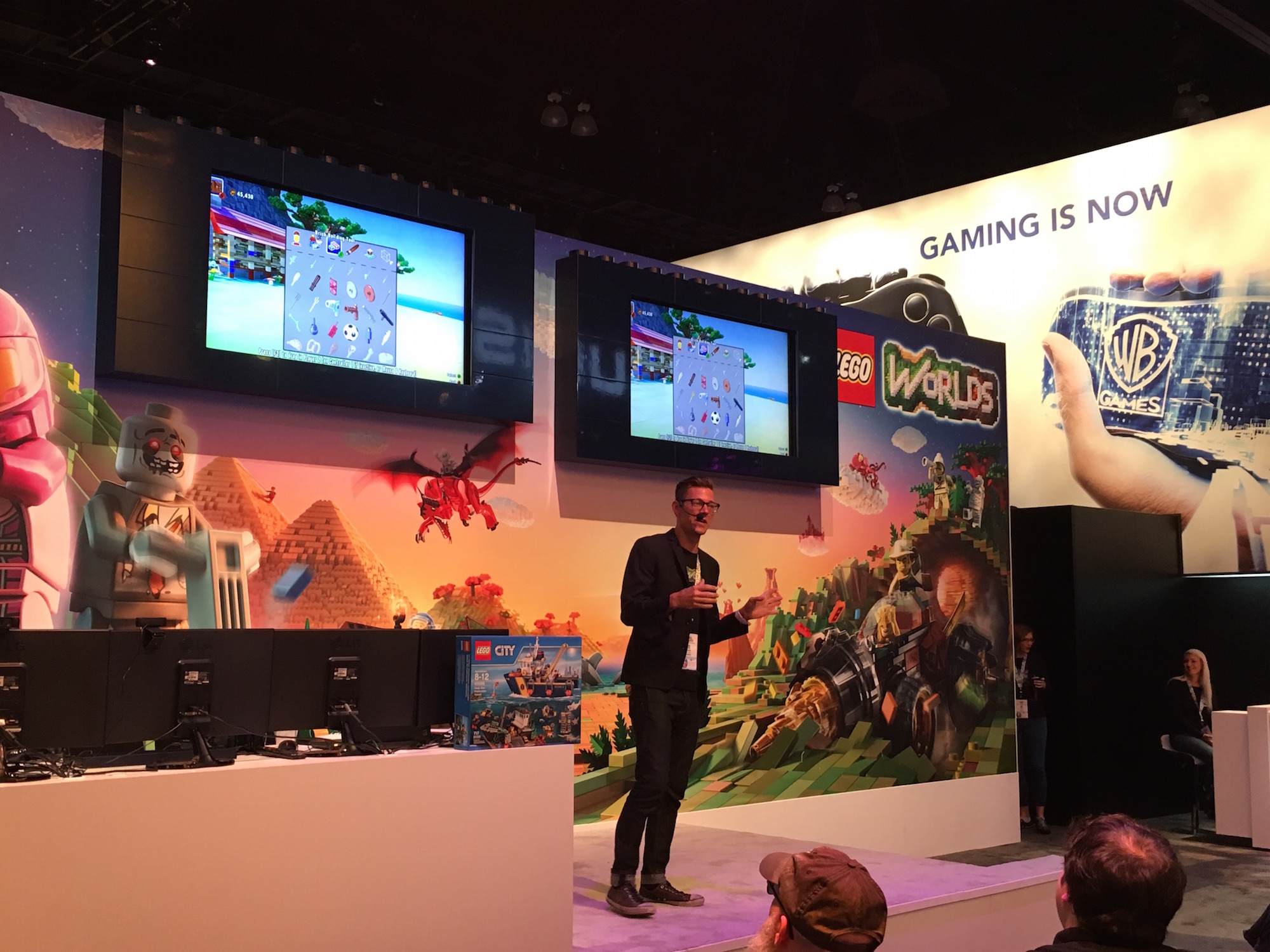Electronic Arts, the company behind lightsaber-rattling Star Wars games, among other blockbuster franchises, was not the only conspicuous absence at the Electronics Entertainment Expo (E3). The Games and Learning Summit of 2015, which brought together startups, universities, game studios and even federal education officials, also did not return.
Is the skittishness brought on by the failures of the past and the uncertainty of the present market?
Nonetheless, there were a handful of edugaming updates from the cacophony of E3’s main floor, and more than a few attendees believed that videogames had taught them valuable lessons both in and out of the classroom.
LEGO gave more news on LEGO Worlds at E3, an open-world game in which players use the digital versions of the signature blocks to reshape their environments. Players can create, destroy and other manipulate buildings, vehicles and natural formations. “Everything you can do with LEGO, you can do in LEGO world,” said LEGO promoter Daniel McGuffey said during his demonstration of the game. LEGO Worlds has been in early access beta since late 2015, and the blockmaker said that the full game would be available for purchase in early 2017.
When asked if the game was LEGO’s answer to Minecraft, Chris Rose, an assistant producer on the game, claimed “that isn’t our intention. This game more comes from the question, ‘Why wouldn’t we make this?’ It’s a natural extension of LEGO that’s been in development for three and a half years. We’ve wanted to, but technical limitations have stopped us before now.”
Rose also noted that teachers have already started asking him about possible educational modifications. “We’ve seen pictures of in-class use on Twitter. Teachers are using it to teach sculpting in art class and engineering.” He said his studio did not have plans for an education-specific version like Minecraft: Educator Edition (which came five years after the release of the original). Rose said, “The whole game should be an effective classroom environment and tool.” Can multiple students interact in one world at once? “Currently, one world supports two players, but we’re working on upgrading that to four and then expanding that as much as we can,” Rose said.

Sid Meier’s Civilization VI also debuted at E3 with a batch of updates, detailed by Game Informer Magazine. The game tasks players with nurturing a fledgling people from the Stone Age to the Space Age. In the upcoming version, players can zone their cities into specific districts to promote specialization among the citizens, advance their government with policy research and experiment with diplomacy.
As a parallel feature to the popular Science Tree feature, which portrays scientific improvements as a literal, continuous tree of knowledge, players can now make their ways through the Civics Tree. The new dendritic chart tracks policy progress and gives players a mix-and-match kit of laws and regulations. Students are in control of the pace of the research through the assignation of specific tasks that correspond to technological or governmental advances.
Players will also a part of a more complex an expanded suite of actions to take when interacting with another civilization. It’s now possible to invite foreign dignitaries to visit a player’s own capital, but other civilizations will have hidden agendas like a dislike of military aggression or a disrespect for a small military.

What have video games taught you?
There is a long-running streak in educational discourse that video games dull children’s intelligence, but there have also always been those who believe otherwise. The latter, obviously, made a bigger showing at E3. We asked the diehard enthusiasts about what videogames have taught them.
We talked to the husband-and-wife duo behind the popular YouTube channel MetalJesusRocks, who met each other at games publisher Sierra On-Line in the 1990s. MetalJesus, the star of the channel, has amassed a collection of more than 6,000 games in his lifetime and creates videos about them, general game collecting, heavy metal and retro gaming.
“I love stories; I was always a big reader. My favorite games reflect that; they’re an extension of a novel or a story that I’m the star of,” the husband said. “They further my interest in a topic. For instance, I was blown away by the Playstation virtual reality demo of a game called ‘The Robinsons.’ You play as a young boy surviving on a desert island. You’re climbing trees, getting water, immersing yourself in the natural environment. The best part, though, is when you deal with the dinosaurs who inhabit the island. That’s a wonderful way to introduce kids to dinosaurs: live with them.”
His wife, who handles the financials and merchandising associated with the channel, agreed: “The puzzles of games ask kids to understand the rules of a world and work within them to solve a problem. That’s a great skill to apply to any class. It was for me.
She also thinks that games are starting to prepare players for life’s abject moments: “The industry has matured,” she said, “and indie games are starting to explore difficult themes like sickness, death and loss and really difficult emotions. More genres are investigating previously untouchable topics.”
Kelsey Lewin, who owns three retro gaming stores in Seattle and sometimes appears in MetalJesusRocks videos, said that her generation of video games taught her about interpersonal interactions and its rewards. “MMOs (Massively Multiplayer Online Games) were becoming big when I was in middle school, so I was talking to people from all over the world when I was playing. I was learning social skills and starting to understand how people could lead lives so different from mine. I don’t think about Sweden every day, but playing with these people made it a real place where real people live.” Lewin was at E3 celebrating her stores’ recent acquisition of every game ever made for the recently discontinued original Xbox.
Mitchell Vogel, a Nintendo Life writer covering Nintendo in the United States, felt that games could be both beneficial and detrimental to learning. “Games can suppress creativity; gameplay is similar and repeatable, especially within genres,” he said. “You may get stuck.
But “on the other hand, they can encourage logistical thinking and problem solving. Like the Tetris effect, where after you’ve been playing Tetris for a long time, you start to see the world in blocks that fit together,” he reflected. “It’s happened to me. Gaming conditions your thinking, which can be good and bad.”


